This month’s APPG on drones meeting was co-hosted with Afghanistan Withdrawal Group. The Group was launched to press for British withdrawal and consider constructive ways in which the conflict might be ended. The Group is co-chaired Paul Flynn MP (Lab) and Caroline Lucas (Green). Supporters are drawn from across the political parties. Unlike the APPG, their meetings are open to the public.
The joint meeting was co-chaired by Paul Flynn and Baroness Stern, the APPG’s Vice Chair. The speakers were Chris Cole, from Drone Wars UK and Rafeef Ziadah, Senior Campaigns Officer (Militarism and Security) from the War on Want.
Paul Flynn MP began by introducing Chris Cole; he also drew attention to a proposed demonstration at RAF Waddington, to take place on 27 April. Chris Cole opened his presentation by highlighting the key issues around the use of drones in Pakistan and Afghanistan. He pointed to the rise in the number of drone strikes, with there only being 9 strikes by drones between 2004 and 2007; this suggests a massive escalation when compared with the figure of 1200 total strikes being recorded between 2004 and 2013. He also pointed to the growing availability of this technology and the lower political cost of warfare that drones provided. The financial cost was also an issue of concern with the Reaper system costing $10-12 million, compared with the $50 million cost of a fighter jet. One of his primary concerns was that the advent of armed unmanned systems has made the option to resort to the use of military force much easier as governments were not faced with returning body bags. He was clear on the different legal contexts in which drones strikes were being carried out in Afghanistan and Pakistan. The US is not formally at war with Pakistan; the drone strikes are carried by a civilian organisation, the CIA. The United States argues its legal authority for strikes in Pakistan comes from the Authorization for the Use of Military Force Act and in the inherent right of self-defence under the UN Charter. This position is disputed by a range of experts, including UN Special Rapporteurs. In Afghanistan, UK action has been authorised by the UN; as a result, international humanitarian law applies.
Chris then highlighted some of the consequences of the use of drones. These included the high numbers of casualties killed and the lack of transparency about the numbers and identities of those killed. He quoted the Independent Reviewer of Terrorism Legislation, David Anderson QC, who had commented on the fact that claims for compensation for drone strikes were becoming an issue in the UK courts. Chris alleged that British Reapers may have carried out targeted killings in Afghanistan which, depending on the circumstances, may be a breach of international law, but due to the veil of secrecy surrounding drone use by the UK Government, it was hard to tell. Intelligence sharing between the US and the UK for drone missions in Pakistan was raised as a potential breach of international law. Chris then moved to a discussion of the definition of ‘directly participating in hostilities’. He noted that under the Laws of War, this term did not apply to those providing food, for example, to combatants. He also pointed out that the International Committee of the Red Cross had provided Interpretative Guidance on the issue, but this is not legally binding.
Chris suggested that the assertion of pinpoint accurate airstrikes is a false one. He pointed out that the advancement of technology has meant that air strikes are now considerably more accurate, especially when compared with 40 years ago and the bombing campaigns of World War II. However there are too many factors that pilots must take into account, meaning a drone is never pinpoint accurate. Chris suggested factors such as the 1 second delay between the pilot pulling the trigger and the missile being released, as well as the drone’s height meaning it is visually impaired through clouds and by its own height, as well as its speed. He also pointed out that a target may be moving as well as the blast radius of the bomb. All these factors eroded a drone’s accuracy.
The lack of transparency around the UK’s use of drones was significant. He noted that the same number of drone strikes had been carried out in Afghanistan by the UK, with 365 strikes, as by the US in Pakistan, with 366. In the latter, over 3000 people had been killed; we do not know how many have been killed in Afghanistan. He made a distinction between the methods of the two countries, with the US using more weapons per strike than the UK. He highlighted concerns around the delay which existed between the button to release the weapon being pushed and the actual point at which the bomb hit. Chris was clear that opposition to this weapon was becoming more widespread. He quoted Kurt Volker, the former US Permanent Representative to NATO who said:
Drone strikes allow our opponents to cast our country as a distant, high-tech, amoral purveyor of death. It builds resentment, facilitates terrorist recruitment and alienates those we should seek to inspire. Drone strikes may decapitate terrorist organizations, but they do not solve our terrorist problem. In fact, drone use may prolong it. Even though there is no immediate retaliation, in the long run the contributions to radicalization through drone use may put more lives at risk.
Chris Cole closed by posing the question as to what would happen to the UK’s drones once we withdraw – would the drones be left behind? Would they continue to be used by the UK, or moved to another theatre?
Paul Flynn MP then introduced Rafeef Ziadah. Her presentation began by emphasising the fact that there was no transparency and accountability around the use of this weapon. She said this was an important issue – we, as citizens, should know what the government is carrying out in our name. She then moved to discuss the long-term impact of drones. Through her experiences of working with communities in Gaza, she found children who were terrified by the sound of drones, and were well aware what this sound meant.
She thought it was important to point out the context in which these attacks were occurring. Afghanistan had the highest infant mortality in the world and the lowest life expectancy. But the state is very militarised, through the involvement of the West and that this military spending was increasing, though with little improvement to the lives of ordinary people.
Rafeef made the point that although the use of drones might reduce the risk for those involved in their use, the risk for those living under them was no less. At the moment, there were approximately five strikes a week. Central to her presentation was the need for transparency and accountability. For example, it was important to ensure that causalities were being counted and investigations into deaths undertaken. Her experience was that this was not happening and indeed organisations such as War on Want were the ones carrying out the investigations.
The relationship between the Ministry of Defence (MoD) and Elbit Systems, was also explored by Rafeef. She commented on the fact that the MoD has been lent Hermes 450 by the Israeli company and there was also a joint venture to develop drones for the MOD. This development had been shrouded by secrecy save for the fact that the development was consistently delayed. Considering this was public money, this was not acceptable. Rafeef concluded by saying that drones were central to the UK’s intervention in Afghanistan and this weapon was raising serious questions around transparency and accountability.
The meeting then moved to question and discussion stage, chaired by Baroness Stern. Questions included the applicability of the legal framework to the CIA and questions of liability. It was noted that the CIA was not exempt from the law. Particular attention was drawn during the discussion to the inquiry being undertaken by the UN Special Rapporteur on Counter-terrorism and Human Rights, Ben Emmerson, on the legality of drone strikes. Much was made of the need to revitalise and strengthen international law, which had been disrupted by the “War on terror”. Concerns were raised at the paucity of the media reporting on Afghanistan and Pakistan in comparison to other recent stories.
A representative of Amnesty International urged the audience to consider the broader human rights issues in Northwest Pakistan, including abuses carried out by the Pakistan military and Taliban; reference was made to their report on this human rights crisis. Additional information was provided by Chris Woods of the Bureau of Investigative Journalism, who provides much needed, and well-respected, data on the US’ covert drone war.
Part of the discussion focused on the work of organisations on this issue. Chris Cole mentioned a number of US organisations, undertaking research and advocacy on drones use: Code Pink and ACLU, among others. Baroness Stern emphasised the importance of the work of the APPG and the fact that its focus was upon Parliamentarians. There was a clear need for Government to be held to account. The APPG’s Researcher drew attention to a forthcoming hearing in the European Parliament on the issue of drones, but also to the lack of discussion occurring on this topic in other legislatures.
Chris Cole finished by saying that although international law has been manipulated in the past, it must be used to hold people and states to account. It may be true that new laws are needed to address these issues but one should not devalue the existing law. He also pointed to the US’s target selection process as an issue, where a target is given a value and this is compared to the possibility of collateral damage. Rafeef closed by also saying we must embrace what power we have in international law and make it as strong as possible, as we do not have many more tools to address this issue. Her final comment was concerning the problem of military recruiters in the US and the manipulation of the ‘video game mentality’ in younger generations.




